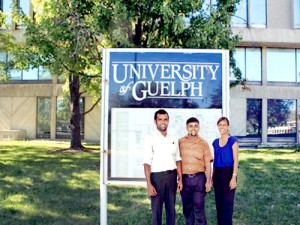Sunday Times 2
Three young scientists make fruity breakthrough
View(s):Three young researchers from the Industrial Technology Institute (ITI), Nisala Gunasekara, Ayanthika Fernando and Dineth Samarawickrama were given the opportunity to work in the well-equipped laboratories of the Departments of Agriculture and Food Science at the University of Guelph in Canada under the supervision of Dr. Gopi Paliyath, Dr. Loong-Tak Lim and Dr. Jay Subramanian
Their Visiting Scientists Programme was funded by a Canadian International Food Security Research Fund (CIFSRF) collaborative grant, awarded jointly to the University of Guelph, Canada, Sri Lanka’s ITI and Tamil Nadu Agricultural University, Coimbatore, India. The grant award supports the project titled ‘Enhancing the Preservation of Fruits in South Asia’ which aims at minimising post-harvest loss so as to make fruits such as mango available to consumers at affordable prices.

The three young researchers at the University of Guelph
The objective of the ITI research team headed by Senior Researcher Dr. Shanthi Wilson is to extend the storage life and maintain the quality of mangoes using safe and environmentally friendly methods. The project integrates expertise from the three partnering Institutes, to develop a cost effective smart delivery system that will extend the freshness of fruits both at pre harvest and post-harvest stages.
The three ITI researchers who participated in the Visiting Scientists’ Programme had comprehensive hands-on laboratory training experience on using specialised equipment and the opportunity to fine-tune their skills on various techniques used during their research.
Research scientist Nisala Gunasekara from ITI’s Food Technology Section gained experience in the qualitative analysis of mango volatiles using solid phase micro extraction (SPME), gas chromatography and mass spectrometry (GC-MS) technique. His studies also included analyses of sugars, organic acids and ß-carotene content during different stages of mango maturity using high performance liquid chromatography (HPLC).
Research scientist Ayanthika Fernando from ITI’s Postharvest Laboratory of the Food Technology section worked on RNA extraction from fruits, the optimisation of the RNA extraction protocol for mango and also perfected her skills on using quantitative real time PCR (qRTPCR) for gene expression analysis of fruits.
Technical Scientist Dineth Samarawickrama from ITI’s Materials Technology Section, meanwhile, worked on the techniques that can be used to develop a composite film containing the fruit ripening inhibitor, which will be used as the smart delivery system. The composite material was made out of banana fibre, bio polymers and synthetic polymers.
The project is nearing completion and results show that a combined approach of using the plant derived biochemical formulation developed by the University of Guelph with the wax on a plant fibre based delivery system proves to be an efficient way to extend the freshness of mango and reduce post-harvest losses.

